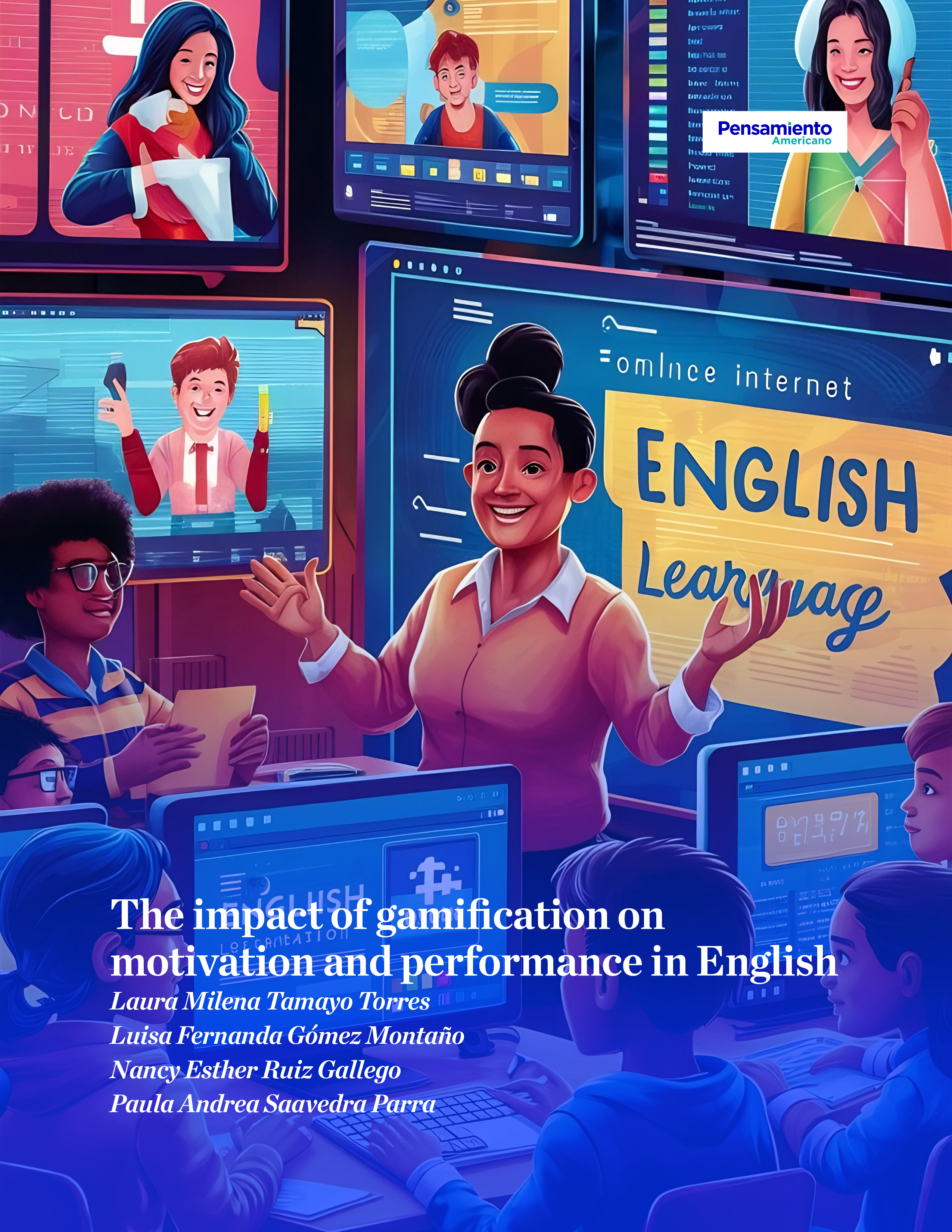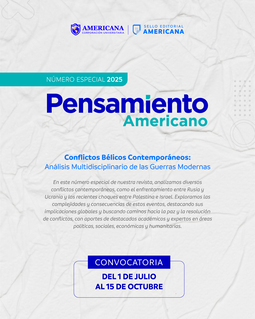El impacto de la gamificación en la motivación y el rendimiento en inglés
DOI:
https://doi.org/10.21803/penamer.18.37.841Palabras clave:
Enseñanza de idiomas, Gamificación, Innovaciones educativas, Educación artística, Rendimiento escolarResumen
Introducción: Este proyecto destaca la gamificación como estrategia pedagógica innovadora para fortalecer la motivación y el rendimiento en inglés como lengua extranjera. Objetivo: Diseñar, implementar y evaluar un manual gamificado adaptado a las necesidades
de los estudiantes, frente a la ineficacia de métodos tradicionales y la diversidad de niveles de competencia. Metodología: Se trabajó con estudiantes de cuarto curso del Colegio Adventista del Sur en 2024, bajo un enfoque cualitativo que incluyó cuestionarios,
entrevistas, observaciones y debates. También se contempló la formación docente y estudiantil para el uso adecuado del material. Resultados: La gamificación favoreció la retención de contenidos gramaticales y promovió una participación, superando el alcance
de modelos tradicionales. Conclusiones: El proyecto ofrece herramientas didácticas concretas y replicables que contribuyen a transformar el proceso de enseñanza-aprendizaje del inglés en contextos escolares.
Descargas
Referencias
Alvis Vargas, Z. L., Ramos Reyes, D. E., Páez Vargas, M. P., Iglesias Ortega, E., & Arana Palomino, W. (2019). Estrategias para la enseñanza de competencias lectoras en el grado décimo del Colegio Adventista del Atlántico “ Max Trummer” [Trabajo de Maestría, Corporación Universitaria Adventista]. https://repository.unac.edu.co/handle/11254/1029
Coello, Y. (2021). Realidad y desafíos de la investigación cualitativa en la educación. Revista Qualitas, 23(23), Article 23. https://doi.org/10.55867/qual23.06
Colegio Adventista del Sur. (2022). PEI Colegio Adventista del Sur.
Denzin, N. K., & Lincoln, Y. S. (Eds.). (2011). The SAGE Handbook of Qualitative Research (4th ed.). SAGE Publications, Inc.
Flick, U. (2018). The SAGE Handbook of Qualitative Data Collection (1st ed.). Sage Publications, Inc.
Gadamer, H. G. (2013). Truth and Method (3rd ed.). Bloomsbury Academic.
González González, C. (2019). Gamificación en el aula: Ludificando espacios de enseñanza- aprendizaje presenciales y espacios virtuales. https://doi.org/10.13140/RG.2.2.34658.07364
Huamaní Quispe, M. del C., & Vega Vilca, C. S. (2023). Efectos de la gamificación en la motivación y el aprendizaje. Horizontes. Revista de Investigación en Ciencias de la Educación, 7(29), 1399–1410. https://doi.org/10.33996/revistahorizontes.v7i29.600
Jara Ramírez, M. A., & Montoya Bedoya, Á. C. (2022). Metodología activa: Gamificación. In M. A. Jara Ramírez (Ed.), Estrategias Pedagógicas Innovadoras (p. 292). SEDUNAC. https://repository.unac.edu.co/handle/11254/1209
Koivisto, J., & Hamari, J. (2019). The rise of motivational information systems: A review of gamification research. International Journal of Information Management, 45, 191–210. https://doi.org/10.1016/j.ijinfomgt.2018.10.01
Marín Montes, V. (2023, January 22). Colombia sigue “rajada” en aprendizaje de inglés: Las preocupantes cifras de la nueva medición. Noticias de Cali, Valle y Colombia - Periodico: Diario El País. https://www.elpais.com.co/educacion/colombia-sigue-rajada-en-aprendizaje-de-ingles-las-preocupantes-cifras-de-la-nueva-medicion.html
Patton, M. Q. (2014). Qualitative Research & Evaluation Methods: Integrating Theory and Practice (4th ed.). SAGE Publications, Inc.
Poveda Pineda, D. F., Limas-Suárez, S. J., & Cifuentes Medina, J. E. (2023). La gamificación como estrategia de aprendizaje en la educación superior. Educación y Educadores, 26(1), 1–18. https://doi.org/10.5294/edu.2023.26.1.2
Prieto-Andreu, J. M., Gómez-Escalonilla-Torrijos, J. D., & Said-Hung, E. (2022). Gamificación, motivación y rendimiento en educación: Una revisión sistemática. Revista Electrónica Educare, 26(1), 1–23. https://doi.org/10.15359/ree.26-1.14
Sailer, M., Hense, J. U., Mayr, S. K., & Mandl, H. (2017). How gamification motivates: An experimental study of the effects of specific game design elements on psychological need satisfaction. Computers in Human Behavior, 69, 371–380. https://doi.org/10.1016/j.chb.2016.12.033
Saldaña, J., & Omasta, M. (2021). Qualitative Research: Analyzing Life (2nd ed.). SAGE Publications, Inc.
Smith, J. A., & Nizza, I. E. (2021). Essentials of Interpretative Phenomenological Analysis (1st ed.). American Psychological Association.
Tamayo Torres, L. M., & Gómez Montaño, L. F. (2024). Impacto de la gamificación en la motivación y el rendimiento académico en el inglés de los estudiantes del grado 4° del Colegio Adventista del Sur. Corporación Universitaria Adventista.
Van Manen, M. (1990). Researching Lived Experience: Human Science for an Action Sensitive Pedagogy (2nd ed.). State Univ of New York Pr.

Descargas
Publicado
Número
Sección
Licencia
Derechos de autor 2025 Pensamiento Americano

Esta obra está bajo una licencia internacional Creative Commons Atribución-NoComercial-SinDerivadas 4.0.
Bajo las condiciones siguientes:
-
Reconocimiento — Debe reconocer adecuadamente la autoría, proporcionar un enlace a la licencia e indicar si se han realizado cambios<. Puede hacerlo de cualquier manera razonable, pero no de una manera que sugiera que tiene el apoyo del licenciador o lo recibe por el uso que hace.
-
NoComercial — No puede utilizar el material para una finalidad comercial.
-
SinObraDerivada — Si remezcla, transforma o crea a partir del material, no puede difundir el material modificado.
- No hay restricciones adicionales — No puede aplicar términos legales o medidas tecnológicas que legalmente restrinjan realizar aquello que la licencia permite.





